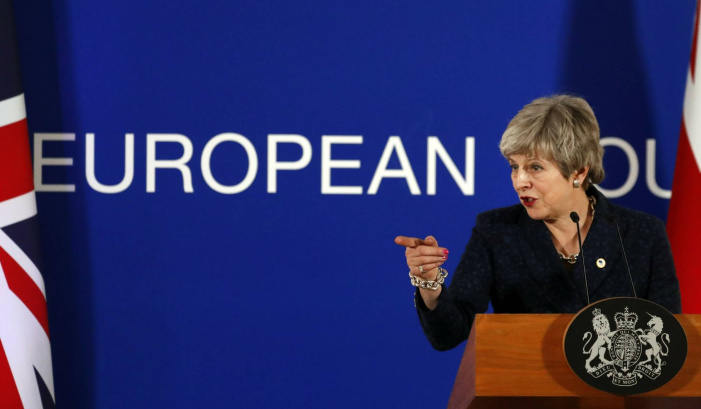New deadline for a Brexit. An ending or another chapter of the story?
Joel Diaz-Rodriguez , 1 avril 2019
The long-lasting history of Brexit seems to be a story without an ending. The last European Council on March 21st has taken a decision on the date for the final exit of the United Kingdom. The European Union leaders had offered a delay until 22 May only if the British Parliament accepts the text adopted in November 2018 (The withdrawal agreement). If it rejects it, the United Kingdom should leave the EU on 12 April 2019 or"indicate a way forward before this date” as the official communication said. Prime Minister Theresa May had requested from her EU peers a delay until 30 June 2019, considering the strong internal resistance –even from her party- to get approved the deal in an attempt to gain more time to convince British Parliament that in two opportunities (in January and on 13 March) have already rejected the deal. She only found a final concession and saw shortened its requested delay. Notwithstanding, things became worst this week. On 29 March 2019, the Parliament rejected for the third time the withdrawal agreement condemning the planned and organized exit and the fate of Mrs. May as Prime Minister. From the EU side, the Decision adopted on 22 March 2019 formalizing the political agreement reached on 21 March 2019 on extending the period under Article 50 became doubtful to be applied. Donald Tusk, president of the European Council has called for an extraordinary meeting of EU leaders on 10 April 2019 to decide on the next steps regarding this new scenario.
But the landscape seems not clear enough about the end of this long history that is already getting closer to its 3rd anniversary, since the vote on leaving the EU on 23 June 2016. The results from this epic week at the British parliament had added more uncertainty to the troubled scenario. On 27 March 2019, MPs voted, on different options for the solution of the impasse, notably on whether Britain should leave the EU without a deal or not as well to call for a second referendum on leaving or remaining. None of the options obtained a majority support of the Chamber. However, the unique of the situation is that MPs now have the control of the situation and nothing seems that the Government can do to retake the initiative. In fact, the prime minister’s promise to resign to the its peers in the conservative party in order to encourage them to vote for her deal, did nothing to solve the internal crisis. The rejecting vote of 29 March 2019 has put the country in an unmeasurable uncertainty.
From the EU perspective, although EU leaders agreed on 22 March 2019 that any re-opening of the withdrawal agreement will be possible, from now many actions can be taken after the rejecting vote. The Decision taken by the European Council made also clear that for the duration of the extension the United Kingdom remains a member state with all the rights and obligations set out in the treaties and under EU law. As result of a possible undefined extension, (one of the most likely scenarios) if the UK was still a member state on 23-26 May 2019, it will be under the obligation to hold elections to the European Parliament.
The term of 22 May 2019 has tried to avoid UK continue being a member with full rights after the elections in order to guarantee the credibility of the process. However, even that term of two months could be not the best scenario for some countries such Italy, Bulgaria or Croatia, whose deadline to call for elections is beginning of April. For legal certainty reasons, it would be convenient for all EU countries to know if the elections to the European Parliament will be held in 28 countries and if they concern the election of 751 MEPs as until now, or 705 from 27 countries in case the UK leaves.
As conclusion, an unpredictable scenario and many options are open for an ending of this divorce. At first, UK would have to leave on 12April 2019, according to the letter of the Council Decision unless EU leaders decide otherwise. The European Commission is already prepared for the worst as it declared officially. In that case, a hard Brexit without any deal, would mean making the UK a third country for the EU and applying WTO rules for the trade between the parties. The other most likely option from EU side is to concede an undefined or long-term extension to the UK with new conditions, but this will have to be adopted by the 27 countries, although France, Spain and Belgium, from the hard line, would require the UK to take part in the elections. From the UK side, the most likely scenario is to remain in the EU for instance and expecting that new political agreements between British parties or with a new UK prime minister can come, given that no agreement neither a contingency plan seems will be achieved between this government and Mps in a short term. This outcome would conduct to give more time for greater support of a second referendum to remain or leave the EU. This option would enjoy quite a support of the citizenship in the UK as was shown on 23 March 2019 in a demonstration in London –around several hundreds of thousands- against Brexit and demanding a second referendum. The End for this story seems not be close.
Joel Diaz Rodriguez. Researcher fellow. "New deadline for Brexit. An ending or another chapter of the story?". Actualité of April, 1st 2019.
Catégorie: Foreign Policy


